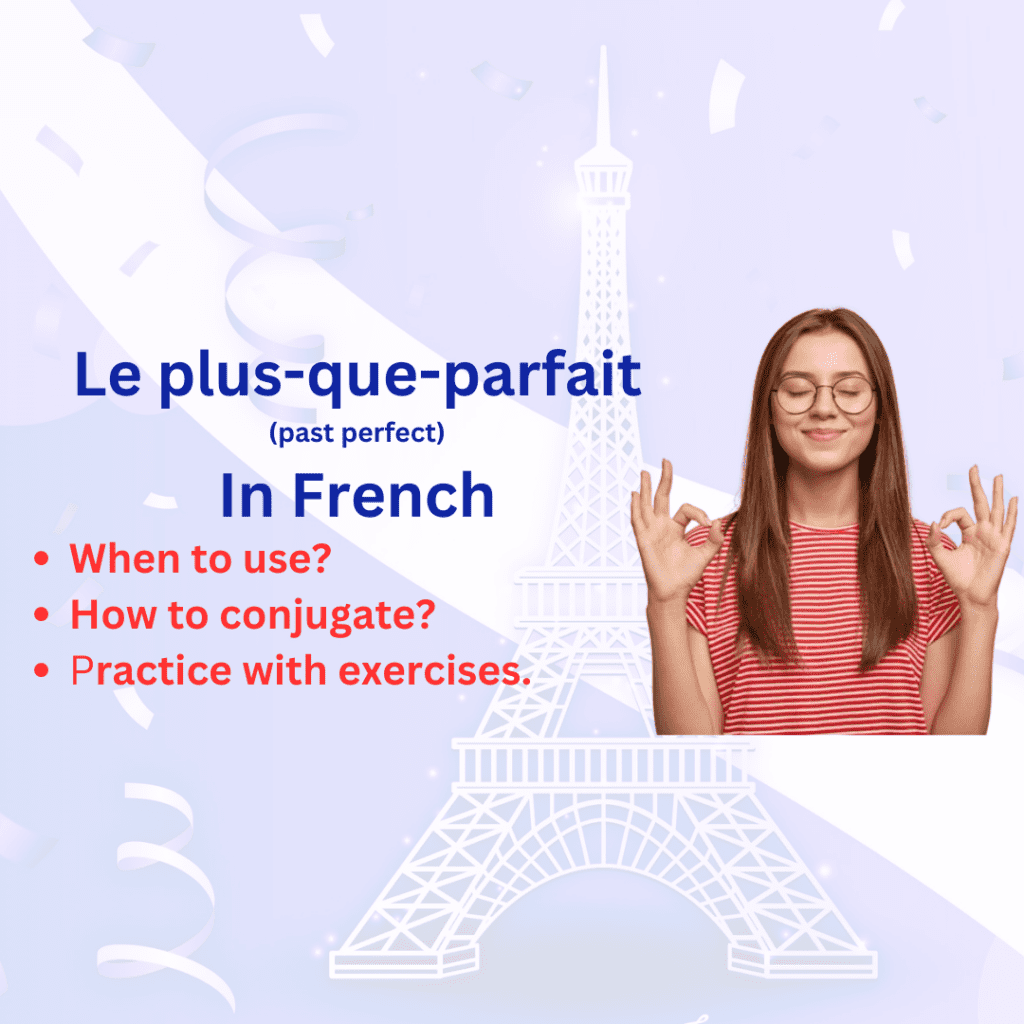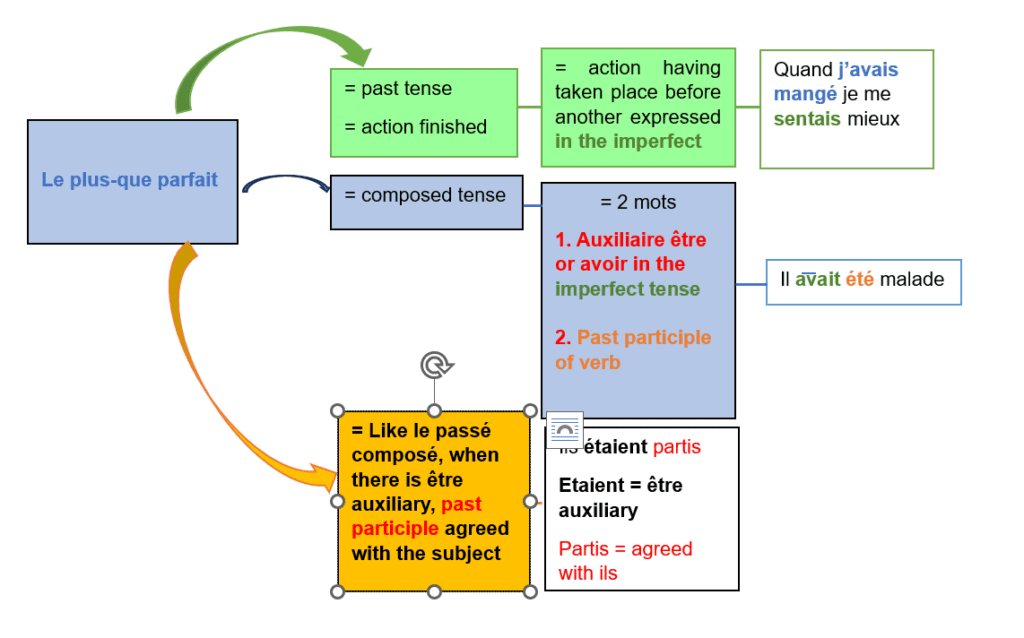
Le plus-que-parfait
Le plus-que-parfait is one of the 4 compound tenses of the indicative mood.
How to identify a compound tense?
A compound tense is a verb form made up of 2 words.
It is conjugated with the auxiliaries être or avoir + a past participle.
Ils avaient construit une cabane.They had built a hut.
Ma sœur était arrivée tôt. My sister had arrived early.
To construct the plus-que-parfait, the auxiliary is conjugated to the imperfect.
The past participle conjugated with the auxiliary être agrees with the subject in gender (masculine, feminine) and in number (singular, plural).
- Elle était vêtue d’une robe sombre. She was dressed of a dark dress.
The past participle used with the auxiliary avoir agrees with the COD in gender and number if it is placed before.
- Elle avait cassé une assiette.She had broken a plate.
- L’assiette qu’elle avait cassée était en porcelaine.The plate she had broken was made of porcelain.
Formation of the past participle
The past participle of verbs of the 1st group ends in -é: travaillé (worked), lancé (launched)…
The past participle of verbs of the 2nd group ends in -i: fini (finished), agé (aged)
The verbs of the 3rd group have past participles whose masculine singular ending can be in:
- u: voulu (wanted)
- : senti (felt)
- is: mis (put)
- it: fait (done)
- t: peint (painted), craint (feared)
PLEASE NOTE: To know the ending of a past participle ending in -is, -it, -t, we use it in a feminine expression. un mur peint (a painted wall); une table peinte – (a painted table)

Le plus-que-parfait
When do we use the past perfect?
– The past perfect presents a past fact, prior to another past fact whose verb is in the imperfect, simple past or compound past.
- Elle avait appris ses leçons quand je suis rentré. She had learned his lessons when I got home.
- Ils avaient fait du sport quand ils vivaient à Marseille.They had done sport when they lived in Marseille.
– Past Perfect expresses a fact that continued in the past:
- Dans sa jeunesse, il avait étudié le mandarin.In his youth, he had studied the mandarins.
Learn to use and conjugate past perfect verbs
The pluperfect is one of the 4 compound tenses in the indicative mode.
- How to identify a compound tense?
A compound tense is averb form composed of 2 words. He conjugates with auxiliaries être – to be or avoir – to have + a past participle.
- Ils avaient construit une cabane.They had built a hut.
- Ma sœur était arrivée tôt. My sister had arrived early.
To construct the pluperfect, the auxiliary is conjugated to the imperfect and the past participle
Example: the verb dire – to tell
| AFFIRMATIVE | NEGATIVE | QUESTIONING | NEGATIVE QUESTIONNING |
| J’avais dit | Je n’avais pas dit | Avais-je dit ? | N’avais-je pas dit ? |
| Tu avais dit | Tu n’avais pas dit | Avais-tu dit ? | N’avais-tu pas dit> |
| Il / elle/ on avait dit | Il / elle/ on n’avait pas dit | Avait-il/elle/on dit ? | N’avait-il/elle/on pas dit ? |
| Nous avions dit | Nous n’avions pas dit | Avions nous dit ? | N’avions-nous pas dit ? |
| Vous aviez dit | Vous n’aviez pas dit | Aviez-vous dit ? | N’aviez-vous pas dit ? |
| Ils/ elles avaient dit | Ils/ elles n’avaient pasdit | Avaient-elle/-ils dit ? | N’avaient-ils/elles pas dit ? |
Example with auxiliary to be => verb to go
- J’étais allé(e) /I went =>depending on whether the subject is masculine or feminine
- Tu étais allé(e) you went =>depending on whether the subject is masculine or feminine
- Il était allé / he had gone
- Elle était allée / she had gone
- Nous étions allés (ées) / we went => depending on whether the subject is masculine or feminine
- Vous étiez allé (ée)(és)(ées) / you had gone => depending on whether the subject masculine or feminine
- Ils étaient allés / they had gone
- Elles étaient allées / they had gone

Le plus-que-parfait
Exercises :
- Vous nous ______________________________ (commander) ce tissu il y a un mois; nous l’avons enfin reçu.
- Avec Paul, nous ______________________________ (arriver) à l’heure.
- Sa mère ______________________________ (apprendre) le français dans sa jeunesse et elle le parlait encore très bien.
- Il était très déprimé depuis qu’il ______________________________ (perdre) sa femme.
- Le candidat à la présidence fut réélu; les sondages l’ ______________________________ (prévoir).
- Nous ______________________________ (avoir) de la peine à retrouver notre chemin.
- Les pommes ______________________________ (tomber) dans l’herbe.
- Tu ______________________________ (déboucher) une bonne bouteille pour cette occasion.
- Les médecins ______________________________ (venir) plusieurs fois au chevet du petit malade.
- Le chien et le chat ______________________________ (se battre) dans la cour.
- Il ______________________________ (être) en retard de quelques minutes.
- J’ ______________________________ (chercher) la solution à ton problème, mais sans succès.
- Les lièvres ______________________________ (se cacher) dans les betteraves.
- Les blanchisseuses ______________________________ (laver) le linge à la rivière.
- Vous ______________________________ (pleurer) sans raison.
Answers :
1) aviez commandé
2) étions arrivés
3) avait appris
4) avait perdu
5) avaient prévu
6) avions eu
7) étaient tombées
8) avais débouché
9) étaient venus
10) s’étaient battus
11) avait été
12) avais cherché
13) s’étaient cachés
14) avaient lavé
15) aviez pleuré
Other exercises here
A bientôt !
Julie

